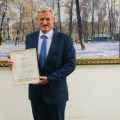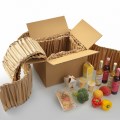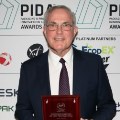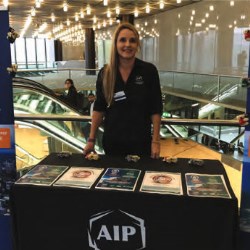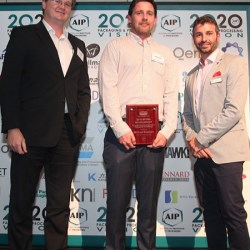If this is your company, CONTACT US to activate Packbase™ software to build your portal.

Simplot Australia made history today as the first company in Australia to successfully have five packaging professionals attain the Certified Packaging Professional (CPP) designation.
This achievement was led by Jason Goode FAIP, Group Packaging and Process Improvement Manager, who had a vision to see his entire packaging team attain the CPP designation together and is a part of Simplot Australia’s support and encouragement for continued professional development of their staff.
Offered through the Australian Institute of Packaging (AIP), the Certified Packaging Professional (CPP) designation is the leading mark of excellence internationally and a must-have recognition of industry proficiency and achievement for packaging professionals.
The Simplot Australia team that attained their CPP includes Jason Goode FAIP, Group Packaging and Process Improvement Manager, Ralph Moyle FAIP, Packaging and Process Technologist, Liz Matthews MAIP, Packaging Technologist, Manh Tran MAIP, Senior Strategic Sourcing Specialist and Roger Cornelius MAIP, Packaging Technologist, who between them have over 100 years of packaging experience.
The AIP asked the Simplot Australia team a few questions about their careers, packaging education and why the CPP designation is so important for the industry...
HOW LONG HAVE YOU BEEN IN THE INDUSTRY? WHAT ARE YOUR AREAS OF EXPERTISE?
JG: I have over 20 years’ experience that covers a broad range of areas, but focuses mainly on all types of food packaging. My Degrees in Materials Science and Engineering provided an excellent foundation for packaging development through the introduction of all types of materials used in packaging. Understanding how they are made and can be modified is critical to utilising them efficiently, making the most of the differences between metals, plastics, ceramics and fibre based products.
MT: I have over 10 years’ experience in FMCG and before that I was in the aviation industry. My area of expertise is in Procurement on Strategic Cost Management in packaging and engineering related. In the last few years, my focus has been looking at packaging product, and equipment related to cost reduction opportunity identification.
EM: I have over 22 years’ experience in packaging and I am a flexible packaging ‘guru’. I have also had a lot of experience at FMGC launching new products in all sorts of formats including glass, rigid plastics, flexibles, frozen, chilled, cans. My career has been a fun and rewarding so far.
RM: I have over 40 years’ experience in the food industry; specifically, in packaging development for the past 20 years. During my career I have specialised in roles in Quality, Operations and Packaging; with a focus on glass, can, aseptic processing and packaging, aluminium cans, flexibles, corrugated, AFFS and much more.
RC: I have over 11 years’ experience in the industry; a combination of both the Pharmaceutical and Food Industry. At Simplot, I am exposed to a myriad of packaging technologies such as flexibles, glass jars, plastic tubs/trays, folding cartonboard and steel/ aluminium cans which keeps my job very interesting.
WHAT MADE YOU APPLY FOR THE CERTIFIED PACKAGING PROFESSIONAL DESIGNATION?
JG: I am a strong believer in Continuous improvement across all areas of business. One of the most important ways to achieve this is through education. Learning from others experience can help avoid mistakes, and improve knowledge to deliver successful products and projects. The Certified Packaging Professional (CPP) designation, that is available through the Australian Institute of Packaging (AIP), shows a level of commitment to learning as well as a commitment to sharing that supports and improves the packaging industry as a whole.
MT: I have been working in the packaging related space for a number of years and have gained many insights and knowledge into the packaging technology informally. I wanted and needed a designation and qualification that would recognise these skills formally, and the internationally recognised CPP qualification, through the AIP and the IoPP, is the trusted authority for this credential for packaging professional across the globe.
EM: Attaining the CPP designation seemed to be a great challenge and the program through the AIP is very-well structured. The Fundamentals of Packaging Technology textbook is also an excellent resource for any packaging professional. Attaining the designation was especially rewarding because we chose to all commit to qualifying and doing it as a team.
RM: I wanted to continue my packaging education as education is the economy of the present and the future and you should never stop learning. The CPP is the highest possible accreditation internationally that a packaging professional can attain and it is recognised in key markets of the western world. The CPP accreditation provides clear recognition for those in the packaging profession who have broad knowledge and experience.
RC: Asides from my Degree, I do not have a formal packaging qualification so completing the Certified Packaging Professional designation allowed me to gauge my knowledge of packaging. After completing the course, I have a greater appreciation of the work required to attain the designation.
HOW IMPORTANT IS ATTAINING THE CPP DESIGNATION TO YOU AS AN INDIVIDUAL?
JG: I saw the opportunity to lead Simplot’s Packaging team through the CPP as a great way to improve the overall performance of the team. We all worked through the training material together, discussing many of the topics at length. The whole process was one of the best team building activities I have experienced with the team, with all members working very hard over many hours, but remaining extremely positive and engaged throughout the process. I was very proud of how they came together to achieve this outcome, even more so when they told me how much they also enjoyed the process, and their achievement.
MT: For me attaining the CPP designation is very important as it allows a formal recognition of my understanding in the packaging arena and that does help with the day-to-day work in the supply chain – Procurement packaging area.
EM: For me the journey is always what is most worthwhile. Reflecting back, I enjoyed sharing the process with my workmates and challenging myself to learn the content of the textbook. It’s a challenging pass rate at > 80%.
RM: The attainment of CPP designation provides me with a tangible recognition of my knowledge and experience in the packaging industry. I am now very proud to be able to add CPP Packaging Professional to the end of my title.
RC: It has been a long time since I have had to study so undertaking the CPP program was quite challenging. The CPP program allowed me to set a goal and be challenged. Attaining the designation has been rewarding and has helped me to better-understand more of what I do day-to-day at work.
HOW IMPORTANT IS THE CPP DESIGNATION FOR THE GREATER RECOGNITION OF PACKAGING PROFESSIONALS?
JG: At the moment, most people involved in packaging development have few, if any, formal qualifications relating directly to packaging. The AIP does offer an on-line Diploma in Packaging Technology and a Certificate in Packaging for the industry, but sadly there is no Degree in Packaging Science or Engineering at Australian Universities for the young people to commence as soon as they finish school. As more people complete the Certified Packaging Professional (CPP) program here in Australasia, hopefully it will help enhance careers in packaging, lead to the adoption of common industry-based terminology and language, and overall raise the profile of packaging professionals working in the industry.
MT: I believe the CPP designation sets the international standard and recognition benchmark for individuals working in Packaging-related fields.
EM: Having the CPP designation is extremely important in Australia because there are little other packaging qualifications and the CPP program is internationally recognised.
RM: With the exception of the AIP Diploma and Certificate courses, there are no other qualifications to distinguish between people who have Packaging Technologist or Packaging Designer on their role title - but have limited knowledge and experience in our industry - and those who do. In order to achieve the CPP designation you need a high-level of both and therefore the CPP creates a clear distinction between these groups. It is extremely important to gain a detailed understanding of all formats of packaging and be able to work anywhere in the world where your accreditation is recognised by the IoPP, AIP and WPO.
May I suggest to all graduates of the AIP Diploma course, who have more than 5 years industry experience, to seriously consider completing CPP accreditation to enhance their industry status even further and obtain deserved recognition as a true packaging professional. The CPP designation is an excellent investment in yourself. Your greatest asset is you, so look after it and develop it as much as you possibly can. When organisations are looking for talented professionals with verified knowledge, skills and experience, you will stand out.
RC: In Australia, there are few courses available for packaging professionals to be truly recognised for their levels of expertise and skill-sets. Australasia now offering this internationally recognised program through the AIP will help promote the importance of the role that packaging within industry and hopefully encourage more of those within the industry to apply for the CPP.



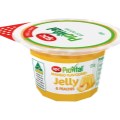

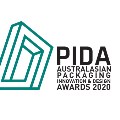
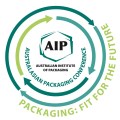
.jpg)



